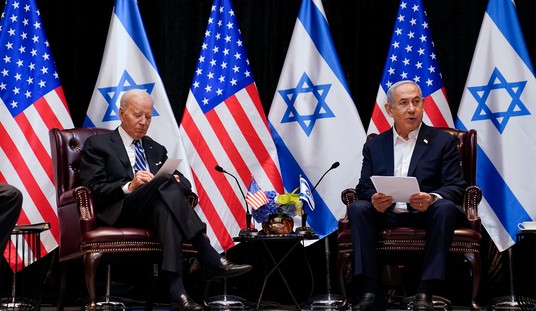The Russian air force has become more aggressive over the last few months, invading NATO air space and coming close to civilian aircraft.
But this sort of thing is downright dangerous.
A Russia Su-27 jet fighter flew dangerously close and nearly collided with a U.S. reconnaissance aircraft this week in the latest aerial provocation by Moscow, defense officials revealed to the Washington Free Beacon.
The Su-27 conducted the close-in intercept of an RC-135 reconnaissance aircraft in international airspace over the Baltic Sea on Tuesday, said officials. The incident prompted a diplomatic protest.
“On the morning of April 7th, a U.S. RC-135U flying a routine route in international airspace was intercepted by a Russian Su-27 Flanker in an unsafe and unprofessional manner,” said Pentagon spokeswoman Eileen M. Lainez.
“The United States is raising this incident with Russia in the appropriate diplomatic and official channels,” she said in a statement.
A defense official said the Russian fighter jet flew within 20 feet of the unarmed reconnaissance jet in what the official called a “reckless” encounter that endangered the lives of the RC-135 crew.
No details were available regarding the mission of the RC-135, which was in a position to monitor Russian military activities in western Russia and Kaliningrad.
In Moscow, a Russian Defense Ministry spokesman confirmed the incident.
Maj. Gen. Igor Konashenkov, the spokesman, said the intercept was carried out after the aircraft was detected by Russian radar.
“Russian air defense radars spotted an unidentified air target over the Baltic Sea making steady progress toward the national border,” he said according to several state-controlled news outlets. The report said the U.S. aircraft was operating without its signal transponder turned on.
“No emergency situation was reported during the fly-by of the American reconnaissance aircraft,” Konashenkov said.
Needless to say, a confrontation of two military aircraft is fraught with meaning — and danger. Given that both sides are on high alert, an “accident” could lead to a misunderstanding which could spiral out of control.
The Free Beacon details some past encounters with Russian military aircraft:
The threatening aerial encounter followed a series of provocative Russian military aircraft encounters, mainly involving the dispatch of nuclear-capable Tu-95 Bear bombers near U.S. and European coasts.
Flights of Russian strategic aircraft near U.S. and allied airspace have sharply increased as part of a campaign of nuclear saber rattling by Moscow.
Adm. William Gortney, commander of the U.S. Northern Command, expressed his military concerns about the increase in Russian military flights and provocations during a briefing with reporters the same day of the RC-135 incident over the Baltic.
“The Russians have developed a far more capable military than the quantitative, very large military that the Soviet Union had,” Gortney said, adding that Moscow has adopted a new strategic doctrine that is being demonstrated by the provocations.
“At the same time, they are messaging us,” he told reporters at the Pentagon. “They’re messaging us that they’re a global power—we do the same sort of thing—with their long-range aviation.”
Gortney said the numbers of incidents have gone up but he did not have the percentages.
“And so we watch very carefully what they’re doing,” he said. The Russians need to adhere to “international standards that are required by all airplanes that are out there,” he said, “and everybody is flying in a professional manner on their side and our side as we watch very closely.”
Eric Edelman, former undersecretary of defense for policy, said the latest incident appears to be part of a pattern of activities by Russia that began around 2007 when Russian President Vladimir Putin began protesting U.S. missile defenses in Europe. The provocative activities have taken place in both the skies and on the sea, Edelman said.
Putin can afford to play a confrontational game as long as Obama is in office. He knows there will be no pushback from the U.S.. The question is, will this behavior continue when the next president takes office? I suspect like most bullies, Putin will back off once it is made clear that the new president won’t tolerate such provocations.









Join the conversation as a VIP Member